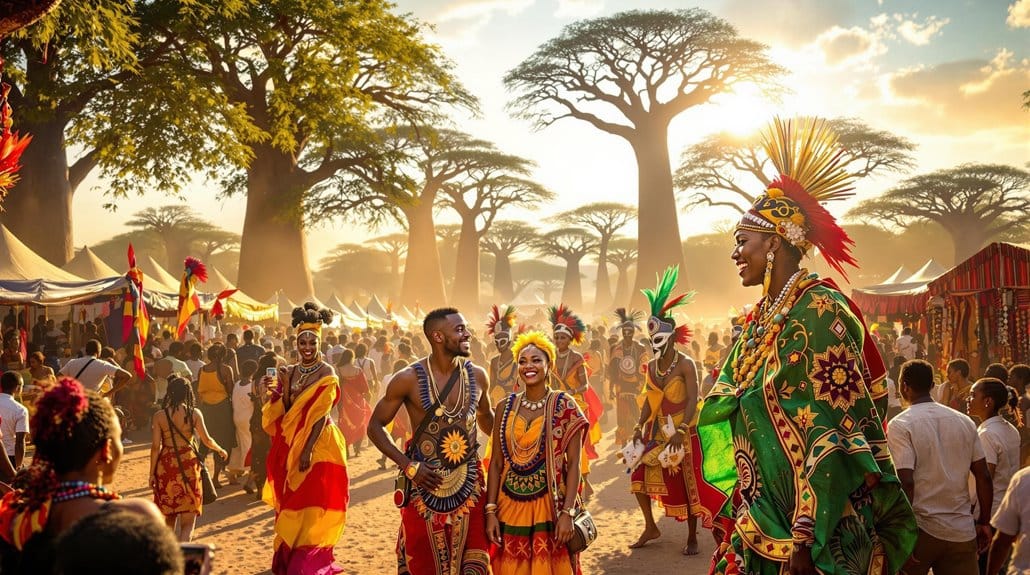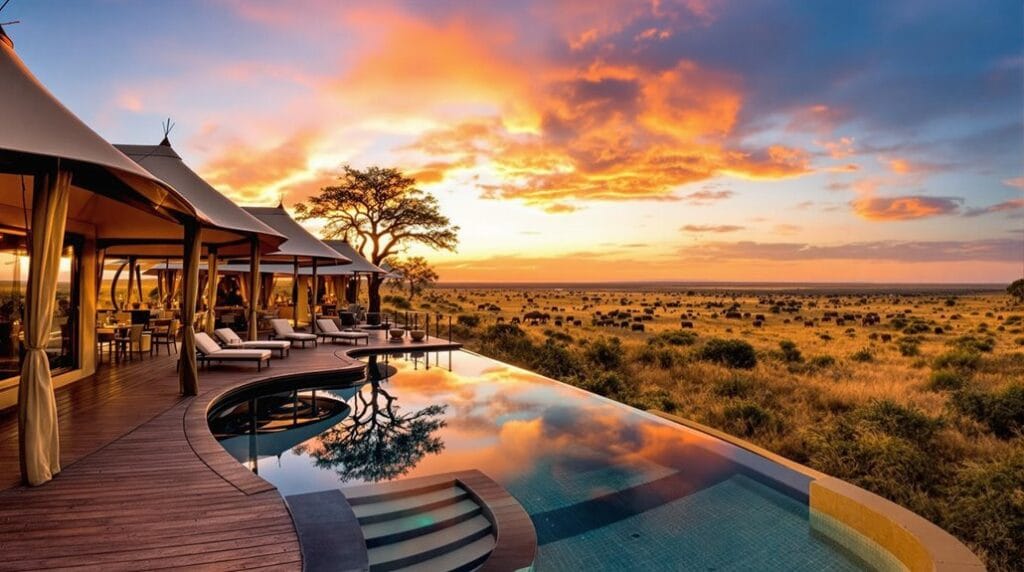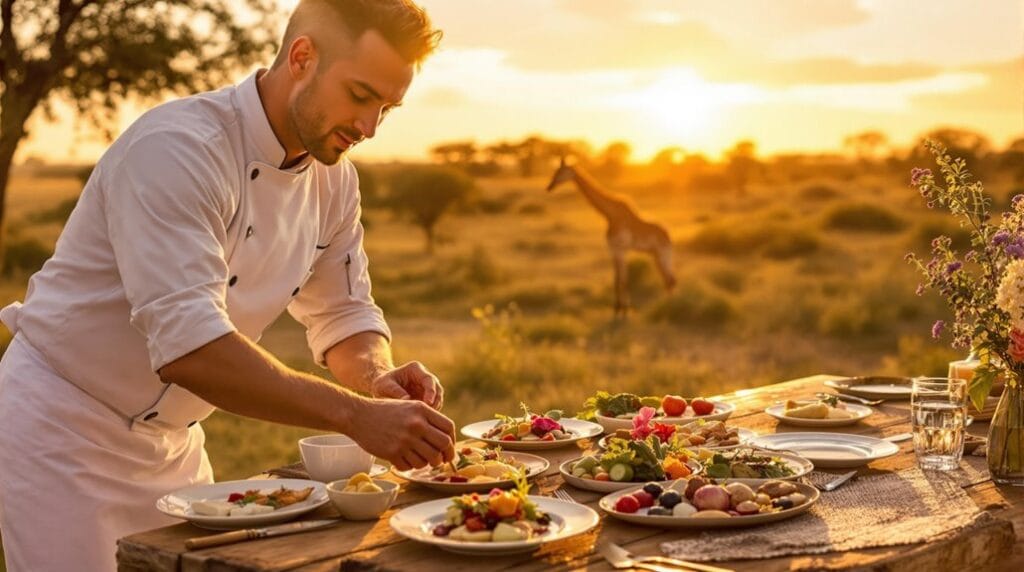When you explore traditional African festivals, you'll encounter vibrant celebrations that unite communities and showcase their rich cultural heritage. Each festival, like Ethiopia's Timkat or Nigeria's Durbar, reflects unique customs and historical significance, inviting you to engage in music, dance, and local traditions. These events not only celebrate identity but also boost local economies, offering travelers unforgettable experiences and opportunities to connect with artisans. As you prepare, remember to respect local customs and consider the profound impact these festivals have on sustainable community growth. Your journey through Africa's festivals is just beginning, with each event offering layers of history and meaning to uncover.
Key Takeaways
- Research festival dates and local customs in advance to enhance your experience and book accommodations early for popular events.
- Embrace local traditions by dressing in traditional attire and engaging with artisans to foster connections with the community.
- Attend workshops and cultural performances to deepen your understanding of local heritage and participate actively in the festival's activities.
- Prioritize safety by checking health advisories, staying hydrated, and securing personal belongings during crowded events.
- Capture your experiences through photography and journaling to document the vibrant cultures and stories encountered at the festivals.
Overview of African Festivals
When you think of Africa, vibrant festivals likely come to mind, celebrating its rich tapestry of traditions, languages, and histories. These African festivals serve as cultural events that unite communities, showcasing the diverse heritage of various ethnic groups. Many festivals coincide with agricultural cycles or significant historical events, becoming platforms for lively music and dance that foster community pride and cultural preservation.
Events like the Timkat Festival in Ethiopia and the Gnaoua World Music Festival in Morocco highlight local traditions while attracting both local and international audiences. You'll see colorful traditional costumes, hear enchanting rhythms, and witness art forms that reflect the essence of the cultures they represent.
These festivals aren't just about celebration; they also act as economic drivers, boosting local tourism and supporting businesses through the influx of visitors. Notable celebrations, such as the Cape Town International Jazz Festival in South Africa and the Lake of Stars Festival in Malawi, promote cultural exchange and global connections, enriching the experience for everyone involved.
Major Festivals by Country
Across the vast and diverse landscapes of Africa, each country boasts its own unique festivals that reflect the rich cultural heritage and traditions of its people.
You'll find a tapestry of celebrations that invite you to experience the continent's vibrant spirit.
- The rhythmic beats of African music filling the air
- Colorful processions weaving through historic streets
- The scent of delicious traditional dishes wafting around you
In Kenya, the Maralal International Camel Derby takes place every August, uniting tribes and attracting adventurers from around the globe.
Malawi welcomes you to the Lake of Stars Festival, a three-day showcase of arts on the shores of Lake Malawi, featuring workshops, theatre, and film screenings.
If you're in Morocco in June, the Gnaoua World Music Festival is a must, blending acrobatic dance with traditional sounds.
South Africa's Cape Town International Jazz Festival, held in late March, draws jazz enthusiasts from around the world to witness incredible talent.
Finally, Ethiopia celebrates the Timkat Celebration in January, where you can partake in joyous processions and communal feasting.
Each of these cultural festivals in Africa offers a unique glimpse into the soul of its nation.
Cultural Significance of Festivals
Festivals in Africa aren't just celebrations; they're vibrant expressions of cultural identity that weave together the diverse threads of ethnic customs, languages, and histories. When you participate in these traditional events, you're not just a spectator; you're immersed in a rich tapestry of community heritage.
Each festival, from the Ouidah Voodoo Festival in Benin to the Gerewol Festival in Chad, reflects local values and beliefs, reinforcing the bonds among participants. These gatherings often align with agricultural cycles or significant historical moments, deepening the connection to the land and shared experiences.
As you witness the performing arts—music, dance, and traditional crafts—you'll feel the pride and passion of community members preserving their cultural legacy.
Moreover, festivals play an essential role in tourism, attracting visitors keen to experience authentic African traditions. This exchange fosters global awareness and appreciation while stimulating local economies.
Unique Regional Celebrations
When you explore Africa, you'll encounter unique regional celebrations that highlight the continent's rich cultural tapestry.
From the vibrant dances of the Wodaabe men at the Gerewol Festival to the breathtaking horse parades of the Durbar Festival, each event reflects traditional practices and customs that bind communities together.
These festivals not only celebrate heritage but also create economic opportunities, drawing travelers keen to witness the beauty and significance of these gatherings.
Cultural Significance of Festivals
There's something truly enchanting about the unique regional celebrations that unfold across Africa, each one rich with cultural significance and history.
These festivals not only honor heritage but also foster community pride and cultural exchange, drawing people from all walks of life.
- The vibrant courtship displays at the Gerewol Festival in Chad, where Wodaabe men dance to win hearts.
- The majestic horse parades of Nigeria's Durbar Festival, showcasing elaborate traditional attire and the spirit of celebration.
- The mesmerizing mask dances at Burkina Faso's Festival of the Dancing Masks, weaving stories through rhythm and artistry.
Each festival captures the essence of its culture, offering you a chance to witness traditional dances, music, and customs that have thrived for generations.
The Kwita Izina Ceremony in Rwanda highlights conservation efforts, while Tunisia's International Festival of the Sahara celebrates Bedouin and Berber traditions.
Participating in these events not only enriches your understanding but also supports tourism, allowing you to connect with locals and their stories.
Embrace the opportunity to immerse yourself in these vibrant celebrations, where every moment is steeped in meaning and shared joy.
Traditional Practices and Customs
Across Africa, traditional practices and customs during unique regional celebrations create a vivid tapestry of cultural identity and community connection.
At the Gerewol Festival in Chad, witness Wodaabe men transforming into living works of art, donning elaborate costumes and engaging in dance competitions to woo potential brides. This vibrant event showcases their unique customs of beauty and cultural expression.
In Nigeria, the Durbar Festival captivates with grand parades of horse riders, celebrating the end of Ramadan and highlighting the rich cultural heritage of northern Nigeria.
As you immerse yourself in the Festival of the Dancing Masks in Burkina Faso, you'll experience an explosion of traditional music, storytelling, and dance, reflecting the local heritage and cultural diversity.
The Kwita Izina Ceremony in Rwanda offers a touching glimpse into community values, where the naming of baby mountain gorillas symbolizes conservation efforts intertwined with cultural significance.
Finally, the Ouidah Voodoo Festival in Benin invites you to partake in vibrant rituals that honor traditional Voodoo practices, demonstrating the spiritual identity of the Beninese people.
Each celebration is a heartfelt invitation to connect, learn, and embrace Africa's rich cultural tapestry.
Economic Impact on Communities
Unique regional celebrations in Africa serve as vibrant economic engines for local communities, transforming cultural heritage into sustainable livelihoods. These festivals not only showcase the richness of traditions but also create significant economic opportunities. Through the influx of visitors, local artisans and vendors experience a boost in income, enhancing their ability to thrive.
- The colorful parades of the Durbar Festival in Nigeria draw thousands, invigorating the hospitality and retail sectors.
- The International Festival of the Sahara in Tunisia promotes local crafts, generating essential tourism revenue for artisans.
- The Festival of Roses in Morocco, attracting around 20,000 attendees, uplifts agricultural products and local economies.
As you immerse yourself in these unique African festivals, you'll witness firsthand how they promote local crafts and foster community growth.
Visitors' spending on accommodations, food, and souvenirs not only enriches the local culture but also encourages investment in the preservation of cultural heritage. Participating in these celebrations allows you to connect deeply with the people and their stories, making your travel experience not just memorable, but also impactful.
Economic Impact on Local Communities
Amidst the vibrant celebrations of traditional African festivals, local communities experience a remarkable economic uplift that reverberates beyond the festivities themselves.
These festivals attract thousands of tourists, stimulating local economies and invigorating hospitality, transport, and retail sectors. For instance, the Cape Town International Jazz Festival generates an impressive R500 million (about $34 million) annually through visitor spending, showcasing how much festivals can bolster economic development.
Events like the Lake of Stars Festival in Malawi draw visitors from over 30 countries, promoting cultural tourism that directly benefits local businesses. This influx not only enriches the community's cultural landscape but also creates job opportunities for artisans, vendors, and performers, fostering a sense of community engagement that's palpable.
Moreover, these celebrations often lead to increased investment in local infrastructure and services, enhancing the quality of life for residents.
As you immerse yourself in these festivals, remember that your presence contributes to a cycle of growth, helping communities thrive. By supporting these events, you're not just experiencing culture; you're becoming part of a larger narrative that celebrates resilience, unity, and economic sustainability.
Health and Wellness Benefits
At the heart of traditional African festivals lies a treasure trove of health and wellness benefits that extend far beyond mere entertainment. When you immerse yourself in these vibrant cultural celebrations, you're not just observing; you're participating in activities that enhance your physical and mental well-being.
- Dancing with locals, feeling the rhythm of life pulse through your veins.
- Sharing traditional foods, savoring rich flavors that nourish both body and soul.
- Engaging in communal activities that foster deep connections and friendships.
These festivals promote cardiovascular health through lively dancing, inviting you to move and groove alongside others. The communal participation nurtures social bonds, enhancing your mental well-being and reducing feelings of isolation.
As laughter and joy fill the air, stress melts away, leaving you in a state of relaxation and improved emotional health.
Moreover, the traditional foods often showcased are packed with nutrients, allowing you to explore healthy local cuisines while enjoying the festivities.
This immersive experience encourages mindfulness, helping you stay present and appreciate each moment, boosting your resilience and overall wellness.
Embrace the holistic benefits these festivals offer; you'll leave feeling rejuvenated and connected.
Tips for Festival Travelers
When you're planning to experience traditional African festivals, it's essential to prepare thoroughly for an unforgettable journey.
You'll want to understand local customs and safety precautions to guarantee you respect the culture while staying healthy.
Plan Ahead for Events
Planning ahead for festival events is essential if you want to immerse yourself fully in the vibrant cultures of Africa. Start by researching festival dates well in advance; events like the Timkat Celebration in Ethiopia and the Gnaoua World Music Festival in Morocco can vary each year.
- Picture the colorful robes and joyful chants at the Timkat Festival.
- Imagine the rhythm of jazz filling the air during Cape Town's International Jazz Festival.
- Envision the mystique of rituals at Ouidah's Voodoo Festival.
Next, consider your accommodations. For popular festivals, such as the Cape Town International Jazz Festival, hotels can fill up quickly, so book early.
Familiarize yourself with the cultural significance and local customs to enhance your experience, allowing deeper connections with the locals.
Weather conditions can vary dramatically, especially for events like the Sahara Marathon in February, so prepare accordingly.
Finally, don't forget to plan your itinerary to include nearby attractions, like the stunning Lake Tana monasteries during the Timkat Festival.
Embrace Local Customs
Experiencing a festival in Africa isn't just about attending events; it's also about immersing yourself in the rich tapestry of local customs that make each celebration unique. To truly embrace local customs, consider these tips:
| Tip | Description | Example |
|---|---|---|
| Dress in Traditional Attire | Wearing local garments shows respect and enhances your experience. | Gerewol Festival in Chad |
| Engage with Local Artisans | Support community artisans at festivals to understand cultural expressions. | Gaborone International Festival |
| Participate in Communal Activities | Join workshops and activities for hands-on experiences that enrich your appreciation. | Bayimba International Festival |
| Respect Photography Customs | Be mindful of photography rules, especially during sacred ceremonies. | Ouidah Voodoo Festival in Benin |
| Learn Local Etiquette | Familiarize yourself with customs and etiquette to engage respectfully. | Timkat Celebration in Ethiopia |
Safety and Health Tips
Maneuvering the vibrant atmosphere of African festivals can be exhilarating, but keeping safety and health in mind guarantees your experience remains enjoyable. Before you immerse yourself in the festivities, check local health advisories and vaccination requirements. Some regions may present specific health risks or outbreaks that you should be aware of.
To enhance your festival experience, remember these essential tips:
- Stay hydrated: Sip bottled water frequently to avoid waterborne illnesses, especially in hot, crowded environments.
- Protect yourself from the sun: Apply sunscreen, wear a wide-brimmed hat, and seek shade whenever possible to shield yourself from harsh rays.
- Secure your belongings: Keep an eye on your personal items and use anti-theft bags or pouches, as bustling festival environments can attract pickpockets.
Lastly, pack a basic first aid kit that includes antiseptic wipes, band-aids, and any personal medications.
Being prepared not only safeguards your health but also allows you to fully embrace the rich culture and vibrant celebrations around you. Enjoy every moment, and stay safe!
Engaging With Local Cultures
Immerse yourself in the vibrant tapestry of local cultures during traditional African festivals, where every celebration offers a unique glimpse into the heart of a community. Engaging with local cultures not only enriches your travel experience but also fosters a deeper understanding of authentic traditions.
At the Gerewol Festival in Chad, you'll witness men performing elaborate dances, adorned in stunning costumes, all to attract partners. This isn't just entertainment; it's a profound expression of identity and attraction.
Participating in the Ouidah Voodoo Festival in Benin reveals the rich significance of Voodoo as an official religion, featuring traditional ceremonies that highlight local beliefs.
At the Cape Town International Jazz Festival, you can enjoy world-class music while attending workshops that encourage cultural exchange among aspiring artists.
Festivals like Sauti za Busara in Zanzibar celebrate the power of African music, bringing diverse backgrounds together through shared rhythms.
Engage with local artisans at the Festival of African Fashion and Arts in Nigeria, where craft workshops let you appreciate traditional skills while supporting local economies.
These community celebrations invite you to connect, learn, and belong in ways that transform your understanding of Africa's rich heritage.
Preparing for Festival Experiences
When planning to attend traditional African festivals, understanding the essential elements of preparation can greatly enhance your experience. Proper preparation not only respects local customs but also immerses you in the vibrant tapestry of culture and community.
- Research festival dates and locations, like the Timkat Celebration in Ethiopia or the Cape Town International Jazz Festival.
- Familiarize yourself with local etiquette, especially the rituals at the Ouidah Voodoo Festival in Benin.
- Secure accommodations and transport early to avoid chaos during peak times.
As you prepare for festival experiences, keep the climate in mind. Pack suitable attire for outdoor events like the Maralal International Camel Derby in Kenya, where August can be hot and dusty.
Engaging with local tour operators offers insights that can lead to immersive experiences, such as participating in community workshops at the Bayimba International Festival in Uganda.
Frequently Asked Questions
What Are the Activities Performed During Cultural Festivals?
During cultural festivals, you'll immerse yourself in vibrant dance performances and music showcases that celebrate local heritage.
You'll see traditional costumes that reflect the community's identity and partake in storytelling sessions that pass down wisdom.
Culinary tastings allow you to savor unique flavors, while art exhibitions highlight local talent.
Ritual ceremonies deepen your understanding of cultural significance, and community games foster connections, making you feel truly part of the celebration.
What Is the Festival in Africa in January?
Did you know January's not just the start of a new year but also a time for vibrant African celebrations?
The Ouidah Voodoo Festival in Benin is a prime example, showcasing its cultural significance through traditional music, local cuisine, and vibrant costumes.
You'll witness community gatherings that honor historical origins while enjoying mesmerizing dances and rituals.
This festival invites you to connect deeply with the rich heritage and spirit of the people.
What Do Africans Celebrate in December?
In December, you'll find vibrant celebrations across Africa, highlighting community gatherings and rich traditions.
African Christmas brings families together for festive meals and cultural performances, while Kwanzaa customs from December 26th honor heritage and unity.
You'll experience year-end festivities filled with traditional rituals, seasonal foods like special breads and stews, and joy in every corner.
Engage with locals, and you'll feel the warmth of shared experiences during this magical time.
What Are the Traditions of Africa?
Did you know that over 3,000 distinct ethnic groups inhabit Africa, each preserving unique traditions?
African spirituality intertwines with ancestral rituals, highlighting the significance of community gatherings.
You'll find traditional music echoing through folk dances, while oral storytelling keeps cultural heritage alive.
Indigenous art beautifully reflects these practices, showcasing a rich tapestry of beliefs.
Embracing these traditions fosters a sense of belonging, connecting you to the continent's diverse and vibrant cultures.
Conclusion
As you commence your journey to experience Africa's vibrant festivals, you'll find yourself immersed in a kaleidoscope of colors, sounds, and stories that'll leave you breathless. These celebrations aren't just events; they're living tapestries of culture that resonate with the heartbeat of the community. Embrace the opportunity to connect with locals, savor traditional cuisines, and cherish the moments that unfold. By doing so, you'll create memories as rich and diverse as the continent itself.









